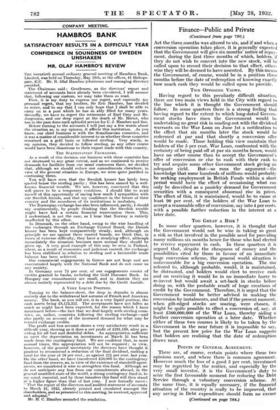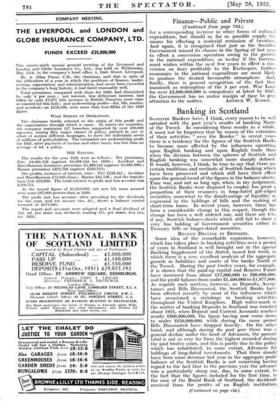Finance—Public & Private
War Loan Conversion
mentioned in the column of Financial Notes. - - WHY CONVERSION IS WANTED.
It may be well to mention one or two of the obvious difficulties which beset the Government with regard to any conversion of the 5 per cent. War Loan. That the Government should desire to convert the issue is natural enough. In the fast place, most of its long: dated issues now stand at a price involving a yield to the investor of only 4 per cent.,'whereas practically 5 per ceni. can still be obtained on the 'War' Loan. In the second place, by reason of the fact that the Income Tax is not deducted at the source; it is'Probable that a certain amount of Income Tax revenue is also lost to the Exchequer, although, of course, the-British bolder of the stock has to declare the interest received upon it in his or her Income Tax Return. Moreover,,,while this non-deduction of tak at the source may inVolve some loss to the Exchequer, it is, of course, of great, service to.numy small investors who, were the tax deducted front their dividends before receipt, would be. put to the trouble of fillingin_the ncceS- sary forms for recovering the tax when such recovery is
permissible. ' - SOME OBSTACLES.
But, however desirable it may be from the Exchequer point of view to convert the 5 ,per cent. War. Loan into a stock giving a loWei: rate of interest, 'there are at least two obstacles in the war the first pis the great size Of the loan, which is well over 12,000,000,000, and the other :is that under the original contract of the loan the Govern- ment cannot compulsorily redeem any part of the loan, but must make the redemption of the whole amount at one time. It will be seen, therefore, that when the moment for conversion is decided upon the Government must either be very sure that the offer of the new stock will be accepted by holders of the old loan, or it must be prepared to find the cash for all those who decide not to cony*. :Originally the contract provided for the Government repaying on three months' notice, but by a recent Finanee (Continued as page 782) Finance—Public and Private (Continued from page 780.) Act thethree-months was altered to six, and if and when a conversion operation takes place, it is generally expected that the Government will give six months' notice of repay- ment, during the first three months of which, holders, if they do not wish to convert into the new stock, will be called upon to record their decision to that effect, other- wise they will be deemed to have assented. By this means the Government, of course, would be in a position three months before the date of redemption of knowing exactly how much cash they would be called upon to provide.
• Two OPPOSING VIEWS.
Having regard to this peculiarly difficult situation, there are two main views held in the City with regard to the line which it is thought the Government should follow. In some quarters there is a strong feeling that having regard to the extent to which long-dated Govern- ment stocks have risen the Government would be undertaking no great risk in sending-out with the dividend warrants on the War Loan on June 1st a notification to the effect that six months later the stock would be redeenied at par and that shortly a conversion offer would be made. Those holding this view maintain that holders of the 5 per cent. War Loan, confronted with the certainty of being paid off at par six months hence, would have no other course than to accept the Government's offer of conversion or else to rush with their cash to try and acquire some other Government stock giving an adequate yield. Butso runs the argument—the knowledge that some hundreds of millions would probably be seeking employment in British Funds within a short period would have the effect of occasioning what can only be described as a panicky demand for Government securities with a consequent abnormal rise in prices. The effect of this, it is maintained, would be to cause at least 90 per cent. of the holders of the War Loan to accept a reasonable offer of conversion, say into 4 per cents. with a possible further reduction in the interest at a later date.
Too GREAT A RISK ?
In some other quarters, however, it is thought that the Government would not be wise in taking so great a risk as that involved in the possible need for providing many millions six months hence for those who had elected to receive repayment in cash. In these quarters it is argued that, despite the cheapness of money and the possibilities cited by those in favour of an immediate huge conversion scheme, the general world situation is unfavourablee for a big conversion operation. The rise referred to, although probable, would, it is maintained, be distrusted, and holders would elect to receive cash and on receiving it would be in no immediate hurry to re-invest but would await a set-back in stocks before doing so, with the probable result of huge creations of credit by the Government. Therefore, it is urged that the Government would be better advised in making the conversion by instalments, and that if the present moment, when gilt-edged stocks are soaring, were chosen, it might be quite possible to effect a conversion of, say, at least £500,000,000 of the War Loan, thereby aiding a further conversion operation at a later date. Whether either of these two courses is likely to be taken by the Government in the near future it is impossible to say, but the present low price for the War Loan suggests that holders are realizing that the date of redemption draws near.
POINTS OF GENERAL AGREEMENT.
There are, of course, certain points where these two opinions meet, and 'where there is common agreement. However much the loss of a good 5 per cent. investment may be regretted by the rentier, and especially by the very small investor, it is the Government's duty to seize the first favourable moment for reducing the Debt Service through a voluntary conversion scheme. At the 'same time, it is equally necessary, if the financial situation of the country is really to be improved, that any saving in Debt expenditure should form no excuse
(Continued on page 784.)
Finance—Public and Private
(Continued from page 782.) for a corresponding increase in other forms of national expenditure, but should so far as possible supply the means for effecting a material remission of taxation. And again, it is recognized that just as the Socialist Government missed its chance in the Spring Of last year to effect a conversion operation owing to the growth in the national expenditure, so to-day if the Govern- ment wishes within the next few years to effect a con- version on lines profitable to the Exchequer, further economies in the national expenditure are most likely to produce the desired favourable atmosphere. And, finally, there is general recognition of the fact that inasmuch as redemption of the 5 per cent. War Loan for over £2,000,000,000 is compulsory at latest by 1947, the Government has no undue margin of .time to give










































 Previous page
Previous page